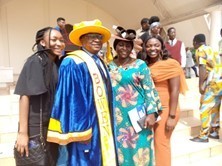New Partnerships Forged at Religion in the Global City Conference

What would happen if you brought together dedicated professionals from the fields of religion, human rights, economics, and academia—the likes of Jeffrey Sachs, Richard Cizik, and Emilie Townes, for example–to address the intersection of globalization and religion in urban settings?
NYTS did just that at the Interchurch Center on October 7, 8 and 9, 2009, with a conference entitled Religion in the Global City: Faith, Justice, Action. The result was, by all accounts, the sparking of valuable new insights and new collaborations, as well as a desire to move this dynamic synergy forward.
Sachs, Director of the Earth Institute at Columbia University and former Director of the UN Millenium Project, jumpstarted the dialogue with a keynote on “Economic Justice in a Diverse Society.” Dr. Luis Rivera-Pagan challenged the group to consider a theology of migration, while other keynoters Saskia Sassen and Emilie Townes emphasized new social patterns in the global city and racial justice, respectively. Adding to the stellar lineup were distinguished responders such as David Gonzalez of The New York Times, Rev. Bob Coleman, Dr. David Daniels, and opening preacher James A. Forbes, Jr.
The conference featured seven working groups (“streams”) which addressed the following topics: Environmental Justice, World Christianities, Ethical Leadership in the Global Economy, Cultures of Peace, Community Analysis & Action, Youth, and Women in the Global City [see summaries below]. These groups and their concerns will form the basis of ongoing work through the year in the form of presentations and discussions open to the NYTS community.
The seminary’s Center for World Christianity and the Center for the Study and Practice of Urban Religion (C-SPUR) served as primary hosts of the conference. Conceived by the late Dr. Lowell Livezey and Dr. Lois Gehr Livezey, the conference was supported in large part by a grant from the Henry Luce Foundation, with help from a number of institutions and individuals, and by the work and advice of a dedicated planning committee. The seminary is grateful for all who supported and participated in this important gathering.

